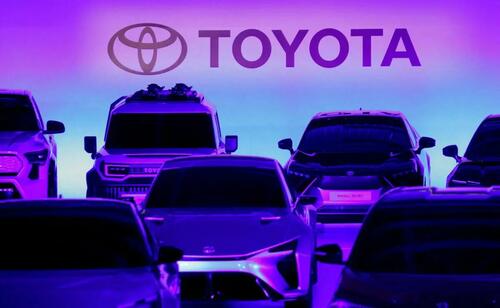Japan: EV Skeptic Toyota Chairman Says People Are ‘Finally’ Waking Up To Reality Of Electric Vehicles
Authored by Tom Ozimek via The Epoch Times

Toyota’s chairman and former CEO, Akio Toyoda, told reporters at an auto show in Japan this week that waning demand for electric vehicles (EVs) is a sign that people are waking up to the reality that EVs aren’t the silver bullet against the supposed ills of carbon emissions they’re often made out to be.
“People are finally seeing reality” about EV technology, Mr. Toyoda told reporters ahead of the Japan Mobility Show in Tokyo this week, speaking in his capacity as the head of the Japan Automobile Manufacturers Association, the organiser of the event.
Mr. Toyoda, a long-time sceptic of a full-steam-ahead adoption of EVs, stepped down from his role as CEO of Toyota this year amid criticism that he wasn’t serious enough about pushing the company into a quick adoption of battery-powered cars.
Asked by reporters at the auto show about his thoughts about falling EV demand, Mr. Toyoda’s response implied that he feels vindicated in his reluctance.
“There are many ways to climb the mountain that is achieving carbon neutrality,” he said while suggesting that consumers are finally waking up from a dreamscape pushed by climate change alarmists that puts EVs on a pedestal and overhypes their benefits while downplaying their drawbacks.
His remarks came as demand growth for EVs in various markets has slowed, leading some companies to dial back their electrification plans.
Market research firm Canalys estimates that global sales of EVs rose 49 percent in the first half of this year, down from last year’s 63 percent pace of growth.
Honda and General Motors announced on Wednesday that they were scrapping a $5 billion plan to develop EVs together, while GM said on Tuesday that it was slowing its electrification strategy.
GM is “moderating the acceleration of EV production to protect our pricing, adjust to slower near-term growth in demand, and implement engineering changes that will bolster profits,” GM Chief Financial Officer Paul Jacobson said in an Oct. 24 earnings call with reporters, in which he revealed that the weeks-long strike by unionised auto workers had already cost the company $800 million and counting.
Ford said earlier this month that it would temporarily cut one of three shifts at a plant that builds its electric F-150 Lightning pickup truck after slowing its EV ramp-up in July. remove
“EV demand next year could be lower than expectations,” Lee Chang-sil, chief financial officer at South Korean battery maker LG Energy Solution said on Wednesday, per Reuters.
Transportation Secretary Pete Buttigieg, who has been helping the Biden administration push EVs onto reluctant drivers, recently acknowledged some their drawbacks, saying he’s had trouble finding reliable EV charging stations. His admission came as the federal agency he helms announced $100 million in funding for EV charging stations.
Mr. Toyoda’s remarks at the auto show that people are becoming more clear-eyed about the drawbacks of EVs stood in some contrast to an EV-boosting speech given by the current Toyota CEO and President, Koji Sato.
Mr. Sato spoke at an Oct. 25 press briefing at the Japan Mobility Show, kicking off his presentation by hyping up EVs.
“The first story is our future life with battery EVs,” he said, according to a transcript of his remarks. “They are not only eco-friendly. Electric cars also offer their own flavour of driving fun and automotive seasoning.”
However, in order to execute on “our vision for battery EVs,” Mr. Sato said that Toyota would be “revisiting the fundamental principles of car making” in order to overcome the known drawbacks of EVs, like limited driving range.
He talked up an apparent benefit of EVs, namely a lower centre of gravity and a more spacious interior, calling it “value that only battery EVs can offer.”
“In these cars, the scenery looks completely different,” he said.
But while a lower centre of gravity and more roomy interiors will likely be welcomed by some drivers unless automakers can figure out how to overcome “range anxiety,” they may find EV adoption will wane further.
A major worry among Americans considering the wisdom of switching to an EV is range anxiety, which is the fear of driving an EV and running out of power without being able to find a charging port—and ending up stranded on the side of the road.
A recent study by the American Automobile Association (AAA) found that EV range can fall by up to a quarter when the vehicle is carrying heavy loads.
“Range anxiety remains a top reason consumers are hesitant to switch from gasoline-powered vehicles to EVs,” Adrienne Woodland, spokesperson for AAA, said in a statement.
Another recent study by consultancy Ernst & Young—in collaboration with European energy industry body Eurelectric—found that range anxiety is the second-most cited concern about switching to an EV, with a lack of public charging stations in the top spot.
The study points to an estimated need for 68.9 million chargers across the United States and Canada by 2035 to support the pace of the EV transformation.
President Joe Biden has set a goal of 50 percent of all new vehicles by 2030 being either EVs or plug-in hybrids.




